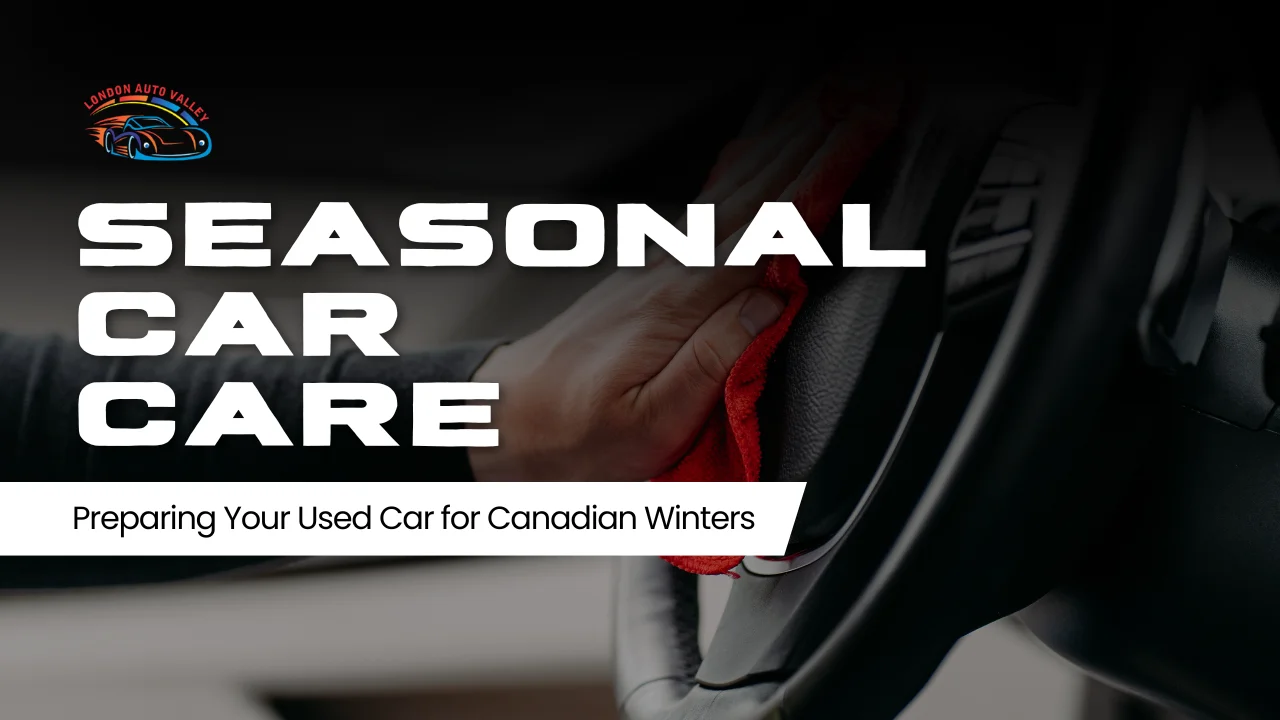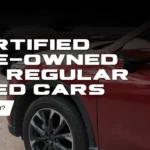

Seasonal Car Care: Preparing Your Used Car for Canadian Winters
As snowflakes fall and temperatures drop below zero, getting your vehicle ready for winter is essential. In Canada, where winters can be tough and unpredictable, regular car maintenance is crucial for safety and performance. Whether you are a new car owner, a daily commuter, or a used car dealer wanting to keep your cars in good shape, knowing how to care for your vehicle in winter is essential. It helps your car last longer and keeps you from being stuck in bad weather.
Why Winter Preparation Matters in Canada
Canadian winters are known for their extreme cold, icy roads, heavy snowfall, and short days. These tough conditions can seriously damage your used car if you don’t take care of it.
Key reasons to prepare your car for winter:
- Safety: Snow, black ice, and freezing rain make driving much more dangerous. Preparing your vehicle can lower the chance of accidents.
- Performance: Cold weather weakens batteries, thickens oil, lowers tire pressure, and puts extra strain on engines.
- Durability: Salt and slush speed up rusting, which can harm the undercarriage and safety parts of your car.
By following seasonal car maintenance guidelines in Canada, you can improve your vehicle’s fuel efficiency, keep its resale value, and prevent expensive repairs later.
Install Winter Tires – It’s Non-Negotiable
For winter car care, winter tires are the top priority. All-season tires might say they work all year, but winter tires perform much better in snow, ice, and freezing temperatures.
Benefits of winter tires:
- Winter tires give you a stronger grip on the road, improving your control of the vehicle.
- These tires help you stop faster on snow and ice.
- They also enhance your ability to turn and keep your vehicle stable.
- Winter tires work best in freezing weather, below 7°C.
Check your tire tread depth and pressure often during winter. Change to winter tires early, before the first frost. In Quebec, it’s required by law to use winter tires from December 1 to March 15.
Battery Health: Don’t Get Left Out in the Cold
Winter weather greatly affects battery performance. A battery that works well in summer may only work at 50% in extreme cold. For Canadian drivers, a dead battery on a cold morning can lead to being stranded.
Winter Battery Checklist:
- Clean the terminals and battery posts to avoid corrosion.
- Test the voltage with a multimeter or at an auto parts store.
- Make sure your alternator is charging properly.
- Replace any battery older than 3-5 years.
Consider getting a portable battery booster for emergencies when you can’t find someone to help jump-start your car.
Keep Your Engine Warm: Block Heaters and Oil Choices
Cold weather can make your engine hard to start. That’s why many people in Canada use block heaters. A block heater warms the engine oil and coolant, which helps the engine start easily in the cold.
Engine oil tips for winter:
- Use synthetic oil; it flows better in the cold.
- Choose lower viscosity oil like 0W-20 or 5W-30 for faster lubrication.
- Check your oil levels more often during winter.
Plug in your block heater three to four hours before starting your car. Use a timer to save energy and make sure your vehicle is ready when you need it.
Fluids Check: Top Off and Winterize
Cold weather affects all fluids in your vehicle, not just oil. To maintain your car during the winter in Canada, check your fluid levels and their condition.
Fluids to inspect and maintain:
- Antifreeze/Coolant: This prevents your engine from freezing. Mix it in a 50:50 ratio.
- Windshield washer fluid: Use one rated for -40°C to prevent freezing.
- Brake fluid: It should be clean and free of moisture for effective braking.
- Transmission fluid and power steering fluid: Keep these at the right levels and check for leaks.
Replacing or topping off fluids is a small expense that can help you avoid serious winter problems.
Windshield & Wipers: Vision is Vital
You can’t drive safely without good visibility. Your windshield is your view of the road, and it needs special care in winter.
Winter windshield care tips:
- Get strong, rubber winter wiper blades.
- Check and refill washer fluid often, and keep an extra bottle in your trunk.
- Use a windshield cover to prevent frost overnight.
- Repair any chips or cracks to stop them from getting worse with temperature changes.
Also, keep a soft snowbrush and a strong ice scraper in your car. Clear the whole windshield, not just a small spot; it’s required by law in many places.
Emergency Kit: Hope for the Best, Prepare for the Worst
A winter emergency kit is essential. You may face road closures, accidents, or breakdowns while driving, especially in remote areas.
Essentials to include:
- Thermal blanket or sleeping bag
- Flashlight with extra batteries
- First-aid kit with extra medications
- High-energy snacks, bottled water, and gloves
- Folding shovel, traction mats, or kitty litter
- Portable phone charger or power bank
Bonus items are a whistle, reflective vest, and battery-operated radio. Being prepared can save lives.
Salt & Rust Protection: Preserve Your Investment
Road salt helps cars grip the road but can harm their metal parts. It causes rust, especially in older cars.
Tips to prevent salt damage:
- Rinse your car weekly, especially after snowstorms.
- Use a high-pressure spray to clean the underside of your car.
- Apply rust-proof coating or undercarriage oil.
- Wax your car before winter for extra protection.
- Check wheel wells, brake lines, and exhaust systems for rust early on.
Taking these steps now can save you money on repairs later.
Lights, Belts, and Hoses – The Often-Overlooked Trio
As the days get shorter and nights longer, your car’s lights become very important. Cold weather can make rubber parts crack and break.
Checklist:
- Check and change dull headlights and taillights.
- Test fog lights and high beams to ensure they work.
- Look for cracks in serpentine belts, radiator hoses, and vacuum lines.
- Lubricate weather stripping to stop doors from freezing.
Small repairs can have a big impact. Don’t wait for something to break; stay proactive with a complete inspection.
Fuel Up Smartly: Keep the Tank Half Full
Keeping your fuel tank at least half full stops moisture from building up inside. Moisture can freeze, which blocks fuel lines and makes it hard to start your car in the cold.
Additional fuel tips:
- Use fuel stabilizers if your car will not be used for a long time.
- Pick high-quality fuel to prevent winter fuel gelling.
- Think about adding fuel-line antifreeze (methyl hydrate).
This easy habit lowers the chance of freezing fuel systems and helps your vehicle last longer in extreme cold.
Book a Pre-Winter Inspection at a Trusted Dealership
Before the heavy snow arrives, schedule a pre-winter inspection with a reliable used car dealer like London Auto Valley. They have years of experience dealing with Canadian winters and provide expert service.
The inspection checklist might include the following:
- Checking brakes for wear and fluid leaks
- Measuring tire tread depth and adjusting tire pressure
- Inspecting the coolant system and topping up fluids
- Evaluating the heating, defrost, and cabin air filter
Let the experts take care of the diagnostics so you can drive confidently, knowing your car is ready for winter.
Recap: Make Winter Driving Safer and Smarter
Driving in Canada during the winter requires preparation and focus. Taking care of your car properly can make your trip safer and easier.
Top takeaways:
- Put on winter tires early and check their pressure often.
- Keep your battery charged and your engine warm.
- Ensure good visibility with clean windshields and functioning wipers.
- Protect your vehicle with rust-proofing and regular washes.
- Rely on local experts like London Auto Valley for advice.
Spend some time and effort now, and your used car will perform well all season.
Add a comment Cancel reply
Comments (0)
Categories
- Blog (19)
Recent Posts
About us

Related posts


Certified Pre-Owned vs. Regular Used Cars: Which is Better?

Eco-Friendly Car Maintenance Tips for Used Cars









